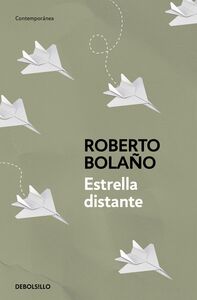Take a photo of a barcode or cover
Questa storia è in pratica la riscrittura dell'ultimo racconto di "Letteratura nazista in America". La storia è sempre quella (dei brani sembrano proprio copiati). Interessante di per sé, ma non aggiunge molto se si è letto l'altro libro (anzi, di quello manca l'ironia).
Esta es la historia compacta e impactante de un ángel de la muerte: teniente de la Fuerza Aerea de Chile, poeta de macabros versos escritos con humo desde su avión, encantador y asesino que mata por el placer de la realización artística, como una suerte de poesía de acción. El libro es también una potente denuncia de la mortífera cultura pronazi que produjo el golpe de estado chileno del 11 de septiembre de 1973 y que llegó a mandar en ese pais por 15 años. Y además de todo eso, es un thriller policiaco muy bien logrado.
Bolaño ya había contado esta historia en forma más escueta, en el capítulo «Ramírez Hoffman, el infame» en su novela anterior, La literatura nazi en América, una antología ficticia disfrazada de enciclopedia. Para la creación de Carlos Wieder (o Ramírez Hoffman en el libro anterior), Bolaño se habrá inspirado en un personaje real, o en varios; recuerda bastante al siniestro y encantador "ángel de la muerte" y capitán de fragata de la armada argentina Alfredo Astiz, que hizo tantos estragos entre las Madres de la Plaza de Mayo y otros defensores de derechos humanos.
Se ha comentado mucho la estructrura cíclica de esta novela, pero para mí su gran lección literaria es la atención a los detalles emocionales para caracterizar a los personajes — como se siente, como se angustia, como espera, dando más impacto a la acción cuando ocurre. Brillante.
Bolaño ya había contado esta historia en forma más escueta, en el capítulo «Ramírez Hoffman, el infame» en su novela anterior, La literatura nazi en América, una antología ficticia disfrazada de enciclopedia. Para la creación de Carlos Wieder (o Ramírez Hoffman en el libro anterior), Bolaño se habrá inspirado en un personaje real, o en varios; recuerda bastante al siniestro y encantador "ángel de la muerte" y capitán de fragata de la armada argentina Alfredo Astiz, que hizo tantos estragos entre las Madres de la Plaza de Mayo y otros defensores de derechos humanos.
Se ha comentado mucho la estructrura cíclica de esta novela, pero para mí su gran lección literaria es la atención a los detalles emocionales para caracterizar a los personajes — como se siente, como se angustia, como espera, dando más impacto a la acción cuando ocurre. Brillante.
mysterious
reflective
tense
slow-paced
Plot or Character Driven:
Character
Strong character development:
Complicated
Loveable characters:
No
Diverse cast of characters:
Complicated
Flaws of characters a main focus:
Yes
challenging
dark
mysterious
reflective
though not as sprawling as savage detectives, or even last evenings; distant star was much darker and stranger than the other books of bolano's i've read. vaguely circling around a serial killer; but probably a story of the narrator's lost poetry and chile's years under pinochet, distant star reminded me a lot of perfume -- another book that combined magic realism with murder and cynicism. this review's longer than i intended it to be -- basically, if you haven't read savage detectives, definitely read that immediately.
takes place in a world where everyone is either a poet, a homicide detective, a serial killer, or a night watchman, but the detectives write poetry and the poets follow inexorable breadcrumb trails towards apartments plastered with pictures of dead women and the night watchmen publish (at irregular intervals) a literary journal, so they're all really the same kind of person anyway. starts as a fairly cautious writerly profile in the vein of bolaño's previous collection, then becomes a bad-vibes death spiral towards the black hole of fascism and an ultimately self-lacerating examination of how that heinous ideology is abetted by the self-importance necessary to think you can make great art.
so in other words, it's bolaño. the same archetypes, the same snowballing literary references, the same characters feeling blindly towards a void they'll eventually fall into. another star whizzing off into the cosmic wastes before it blinks out entirely
so in other words, it's bolaño. the same archetypes, the same snowballing literary references, the same characters feeling blindly towards a void they'll eventually fall into. another star whizzing off into the cosmic wastes before it blinks out entirely
Mi cara leyendo el libro

Estoy segura de que fue profundamente metafórico y emocionalmente impactante. A alguien. Pero me aburría.
Update: 4/25/ 2019
The more I think about this book, the more I dislike it. And by dislike, I mean borderline hate it.

Estoy segura de que fue profundamente metafórico y emocionalmente impactante. A alguien. Pero me aburría.
Update: 4/25/ 2019
The more I think about this book, the more I dislike it. And by dislike, I mean borderline hate it.
dark
medium-paced
Plot or Character Driven:
A mix
Strong character development:
No
Loveable characters:
No
Diverse cast of characters:
No
Flaws of characters a main focus:
Complicated
Me encantaría tener una reseña honesta de este libro, pero lo leí de mala gana para la universidad así que no tengo nada que decir sobre este libro.
like most of bolaño’s work, this book concerns the mystery of a Chilean poet’s life and seeking out the work. I think cowboy graves has some pretty significant overlap with parts of this, if I am reading both correctly. A fun read, but a frankly minor work of his.
I liked this quite a bit & am really quite unsettled by it. I'm not done thinking about it yet. Will be interesting to see where I end up after assigned readings & a lecture & class discussion.


